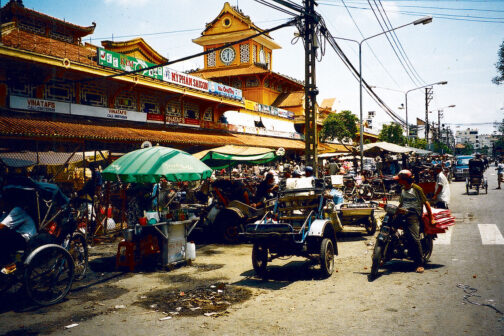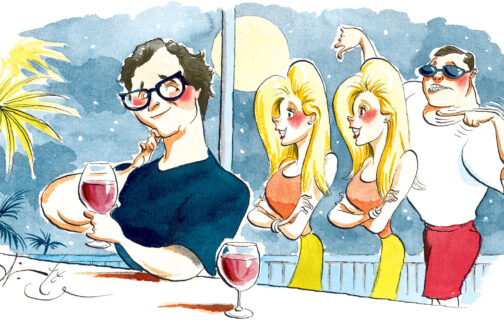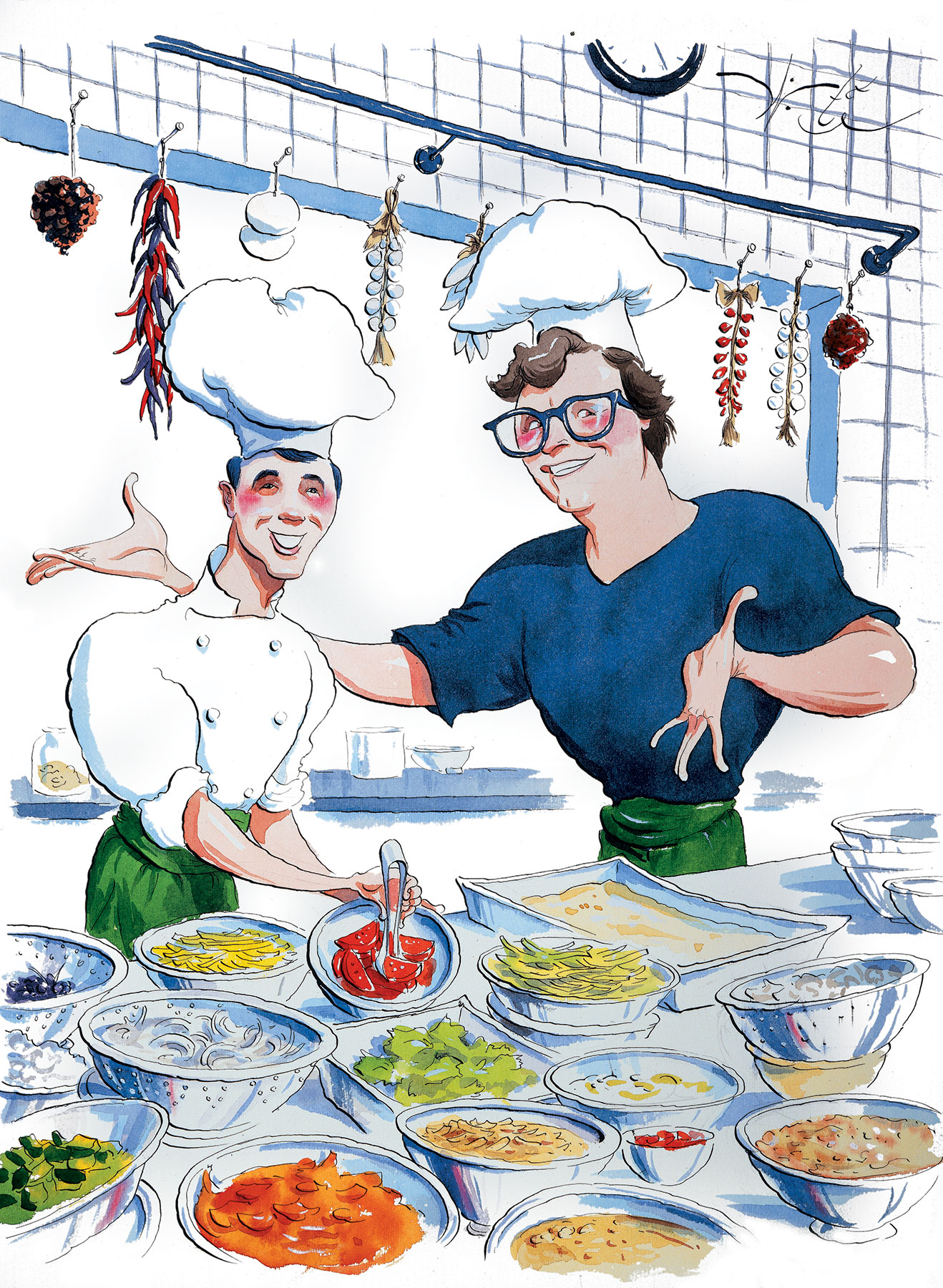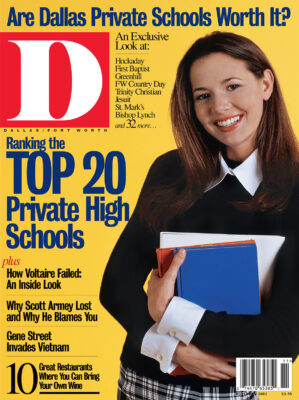Hanoi is the capital of the Socialist Republic of Vietnam. The government of Vietnam is called the Communist People’s Republic. These aren’t just labels; they’re still very serious about this Communism stuff over there. The fall of the Berlin Wall, Castro’s 75th birthday, the collapse of the U.S.S.R. are just downward blips on their political radar screen. So it’s no surprise that Hanoi is much more strait-laced and uptight than Saigon, in the same way that Washington comes off as a priss next to its wild-ass cousin New York. A Saigon friend calls the Hanoi government “those who would keep Saigon from having fun.” But Dace and I didn’t mind the change of tone on our trip north because if there’s one thing in Hanoi that’s untamed, it’s the food.
To appreciate the full menu, we had to shed a few of our Western ideas about how food should be bought and sold and served. For starters, the markets are all outdoors. And not just fruits and vegetables, but also meats and baguettes and mango sandwiches and fresh squid. Ducks, skinned and roasted, hang upside down, ready for purchase. Yes, there are flies buzzing at your ear and dogs snoop around for scraps, but the splashy colors and the sounds of the hawkers’ voices help you ignore the distractions.
We’d already had a taste of true local food back in Saigon. Our Vietnamese guide Thong served us breakfast every morning at his house before our daily rounds. He’d start us off with a rice porridge the consistency of cream of wheat called xoi, plus boiled eggs and a large fresh baguette. In Vietnamese food you can see the influences from France, China, and the United States, but you don’t see a hint of their old ally Russia. When I mentioned Russia, Thong sniffed and said only, “Russians coarse.” Breakfast continued with the most popular dish in the entire Vietnamese repertoire, a noodle soup full of rice and tomatoes and onions and chicken stock called pho. It’s served at almost every meal and tastes better than anything Campbell’s ever dreamed of. This is why nobody’s fat over here: whenever the Vietnamese don’t have time to fix a full meal, they don’t fall back on Doritos or Pop Tarts; they slap a fish in a wrap or boil some soup. After Thong topped off our breakfast with a tiny cup of coffee as thick and black as anything that ever shot out of Spindletop, we were ready to take on the world.My son Dace flipped the monkey steak twice until brown. It took three minutes and it came out — okay. We did a little better with the dog, topping it off with homemade rice-flour cream gravy.

Walking the boulevards and side streets of Hanoi, you stay hungry all day because of the smells: pork, beef, chicken, and mystery meats spiced in a hundred ways and ready in takeaway portions. We finally gave up trying to figure out what was what and resorted to just pointing. One thing shocked me: we ate our fill at outdoor stalls and never—not once—suffered any form of Montezuma’s Revenge, which is more than I can say for my last trip to Mexico. When we got back to the States, our guide sent me an e-mail:
Dear Mr. Gene:
You very brave to eat monkey, snake, and dog. You sick now? You eat so much. I hope you OK. Your belly very big for Vietnamese food.
Thong
Even further off the tourist path are back-alley pipe houses called namow, which serve 100 or more selections for $1 each. Excellent cha gio (spring rolls) in a sheer tortilla with lettuce and mint on the side, spicy wok vegetables, all kinds of shallow-fried meat in bite-sized pieces. And at every food stop, from the street stalls to the hotel dining room, I poured on the best sauce I’ve ever tasted: made from fish, salted and fermented in giant tubs for as long as a year, it’s called nuoc mam. With a strong smell you either love or hate, it’s served like olive oil with every meal, good for dipping or pouring onto darn near everything.
Long before we got to Hanoi, we’d heard about Bobby Chinn, an American who’d opened a fancy restaurant next to the Hanoi Opera House. We found his place and pulled our kitchen invasion one more time. Dace and I chicken-fried shrimp and goat and fresh fish for his staff, then Bobby made us sit in the dining room while he did the same for us. Bobby Chinn’s is the kind of place where embassy types stroll in with their jackets draped over both shoulders—men without arms, we called them. We saw glamorous women and Cuban cigars and lounged at a swank bar that reminded me of the old Wine Press.
The food was one à la carte dish after another—fresh prawns, stir-fried squid, crab claws, and fish stew. We sat still for three hours, as all kinds of meat and veggies arrived, boiled, baked, and sautéed, with so many spices even the waiter lost track. I was just leaning back in my chair, wondering if I could stay awake until we crawled back to our hotel, when two waiters strode out of the kitchen carting the biggest bong I’ve ever seen and set it in the middle of our table.
“Hot damn,” said Dace.
Surely this was the perfect moment for some meaningful father-son communication.
“Now, son,” I began, “even if other cultures condone certain—”
The waiter interrupted me. “What kind of tobacco you like, gentlemen? Turkish, Chinese, Marco Polo Supreme?” The young man stood ready to sprinkle loose tobacco in a drawer so we could draw water through the hookah, smoking our after-dinner pipes like a couple of Ottoman swells. Relieved, I said no thanks. Dace passed, too, but he took it hard.
My son and I were in the rooftop bar of the Caravelle Hotel, enjoying a refreshment and the nighttime view of Saigon, when a pair of German girls worked their way through the crowd toward us. One was named Gretchen, the other—I am not making this up—was named Peaches. These two girls, both beautiful, both blond, were backpacking their way across Vietnam and wanted to know what kind of rooms we had.
“Hey, Elvis, how about another drink?” said Dace, obviously alarmed.
Never one to turn my back on the little darlin’s, I plowed ahead, cautiously.
“Very small room,” I said. “Like a closet. We’re thinking of talking to the manager. Maybe we could get one of those big suites with a waterbed.”
Both girls went, “Ooooh,” and giggled. Did I mention they were twins?
“You are from?” said Gretchen.
“Texas,” I said grandly.
They giggled again.
“Where everything is bigger,” said Peaches.
Dace was behind them now, drawing his finger across his throat.
I was working on a comeback when both girls, as if on a signal, lifted their shirts and kept them lifted long enough for me to inspect the entire North Forty. There were no bras in sight, a row of wholesome 36Ds, and pair of tans that—well, words fail me.
“We want to see your room,” said Gretchen (or was it Peaches?). “But there are four of us and only one of you. What will we do?”
You could have knocked Dace over with a cocktail napkin. I was having the kind of palpitations that back home would have sent me groping for my cell phone to track down my doctor.
“Girls,” I said, “why don’t you cover up your lovelies and let me tell y’all something. Yes, it’s true that my lovely wife Leisa, who I married on a Maui hilltop almost 14 years ago, is back in Texas, 8,500 miles and 12 time zones away. But if anything like what y’all have got in mind was to happen here tonight, I guar-an-TEE you she could smell it from there. So I have to say goodnight, ladies, and may God bless.”

Even after the twins, pouting, moved to the far side of the bar, the sight of those tan beauties was still in front of me, imprinted on my eyes as though I’d stared into the sun.
“That was close,” said Dace.
I thought of a divorce raging back in Dallas between two friends of mine. She unplugged his computer and threw it into their swimming pool. He went through her closet with a pair of shears like he was trimming a hedge. In my social set, divorce is about revenge. It’s vicious and frightening in the same way that, say, polo would be if all the players carried AK-47s.
“Not really,” I said.
The morning after the cancellation of Spring Break With Gretchen and Peaches, Dace said to me, “Dad, can I borrow some money?”
It was our third day in Vietnam.
“What happened to yours? Somebody pick your pocket?”
“I spent it,” he said, looking a little guilty and pleased with himself at the same time.
“On what?”
He unzipped a bag full of watches, all of them gold, all of them Rolexes. I picked one up and examined it: the gold band and the logo looked okay, but the lens was made of plastic. A fake. (As it happens, I know quite a bit about fake Rolexes; I’m wearing one as I type this. Of course I’m far too cheap to buy the real thing, and this one, my fifth, I got for $47 and a pizza from a Maui healer known as Wisdom.)
“What did you pay?” I said.
“Twenty-five bucks apiece. My Christmas shopping is done for the year.”
I was proud that the boy had inherited my best traits, a mania for saving money. Comes in handy in the restaurant business (I painted the Greenville Avenue Bar and Grill myself with paint I found in the dumpster) and in life. In Brownwood we used to say, “Treat every nickel like a manhole cover and you’ll never go hungry.” Still, I had a responsibility to the truth.
“You got taken, son,” I said, and showed him the fake Rolex I’d bought that morning in a tiny shop on Dinh Tien Hoang Street. The band and stem were better quality than his, and a ring of sparkling (fake) diamonds encircled the lens, made of glass.
“Eighteen dollars,” I said. I couldn’t help grinning.
I made him a loan, and we went down to the lobby where the concierge told us a funny story. Across the street from the Caravelle sits the Hotel Continental, home of the bar where Graham Greene set several scenes in his ‘50s novel The Quiet American. When Hollywood filmed the movie here earlier this year (starring Michael Caine, due out in 2003), they decided the actual Continental was not “movie worthy” and instead erected a huge façade in front of the Caravelle for Caine to walk in and out of. It’s cool because that’s the point of the book: nothing in Vietnam is what it seems.
We roamed the streets until we came to a thatched-roof bar, which we pronounced acceptable because we were the only round-eyes in the place. Tourists congregate at run-down joints like Apocalypse Now and the one with “Unofficial Hard Rock Café” scribbled on a cardboard sign. We preferred the rambunctious color of the back streets and pre-war décor.
The walls and floors were dirty, but the jukebox was playing a familiar tune, so I took out a few thousand dong and started pressing buttons. “Hey Paula,” written by Ray Hildebrand of Brownwood, Texas, “Help!, We’ve Gotta Get Out of This Place,” anything that sounded like the ‘60s. Dace brought over a couple of Cokes—real Coke made with cane sugar instead of whatever gives American Cokes their flavor these days—and surprised me with a philosophical question.
“Why’d you want to come over here anyway, Dad?”
Taking a sip from my cane-sugar Coke, I thought about the day when I asked my tough-to-travel-with wife where in the world she wouldn’t like to visit. “Way-ull,” she said, “I don’t think I’d ever want to go to Vietnam.”
I thought about Chairman Mao, the way he stares at me, mocks me every day from my own living room wall. I’ve got 10 original Warhols hanging there, all in a row. A single head shot of Mao in 10 different colors, each one laughing at me for buying into the capitalist manifesto that drives my kind to 6 a.m. treadmills, a heart monitor attached to each wrist. Guys like me lurch around town in monster vans that are bigger than my first-grade schoolroom. We pretend that a high colonic can power-wash two or three decades of bad ideas from our systems. We struggle and compete and still can’t change the fact that there are no pockets in a shroud.
I thought about how I’m feeling jammed up back home, out of fresh ideas. Dallas has more restaurants per capita than any city in America, and the pressure to sell the fattest taco or the flakiest apple pie never lets up.
And I thought about the rice paddies and the tunnels and about never having to smell napalm in the morning.
All I said to Dace was, “I just wanted to see where Tricky Dick met his match.”
Gene Street has risen from being a Coors-slinging bartender and budding restaurateur to the chairman of Dallas-based Consolidated Restaurant Operations and vice chairman of Consolidated Restaurant Co. This is his first novella.
40Gr8






